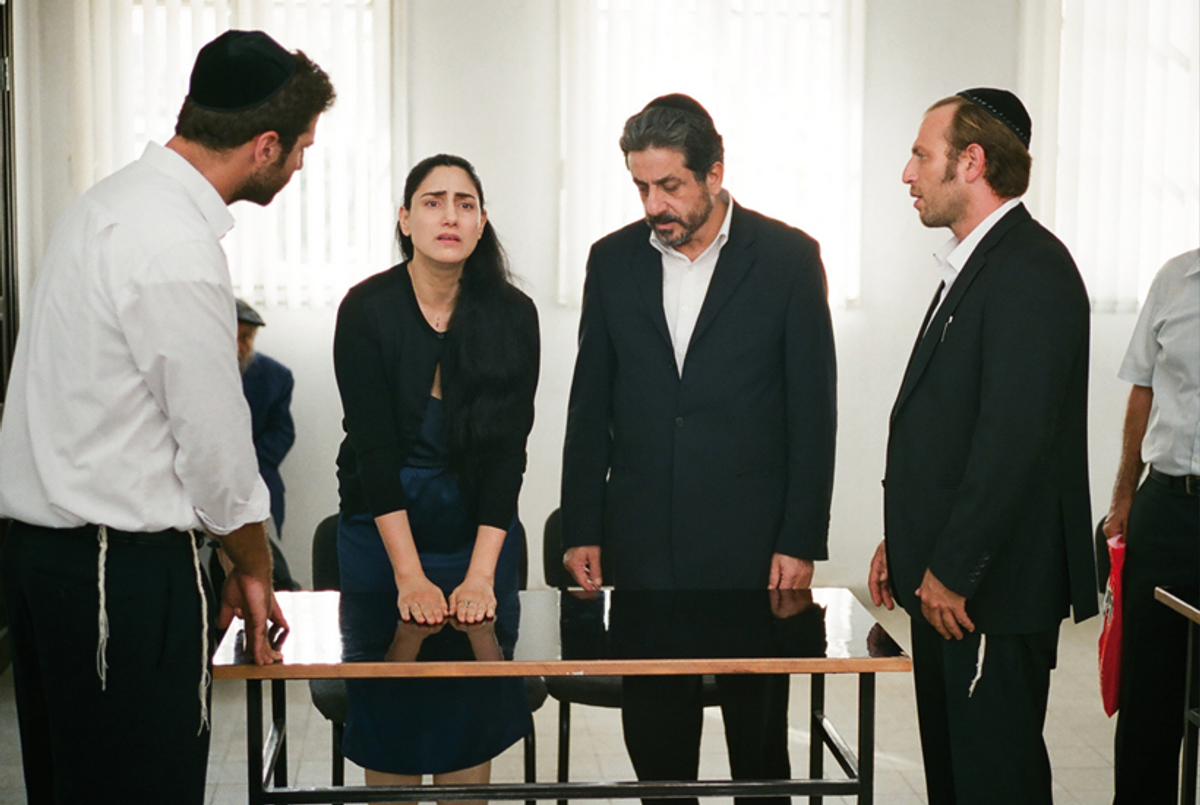
Gett: The Trial of Viviane Amsalem quivers with the sort of nervous intensity common to good horror films and bad marriages: Everyone is polite and speaks softly, but you can tell that some monstrous force is just waiting for the right moment to bite.
Congregated in a small room in Haifa’s rabbinical court are the film’s eponymous heroine, a hairdresser (played by the exquisite Ronit Elkabetz, who also co-wrote and co-directed the film with her brother, Shlomi) and her husband. She is suing for a get, the traditional Jewish divorce document a husband must grant his wife. He refuses her pleas. The judges, bearded eminences, summon witnesses, the couple’s friends and family members, to account for the state of the Amsalems’ union. Rage builds up quietly, in characters and viewers alike, as all ask, with an increasing sense of urgency, just why it is that sweet Viviane is being denied the most basic of human rights, the right to be free and love whomever she wants?
The answer to that question, it turns out, is complicated. Lesser artists might’ve pinned the blame solely on a villainous husband or on imperious rabbis, but the Elkabetz siblings know better. Elisha, Viviane’s husband, is a sweet and gentle man, and we learn, as the couple’s immediates turn intimacies into the wilted stuff of depositions, that he has made an effort to make Viviane happy, bucking the norms of their close-knit traditional community and allowing her to maintain an independent social life. He loves Viviane very much, and is determined to make their marriage work. Often, he comes off almost as an obdurate child, holding on to an attachment without which he’s not quite sure how to proceed.
Similarly nuanced are the rabbinic sages holding court. As the film begins, they appear to adhere to worldviews that are about 800 years past their expiration date, seeing Viviane as a rebellious nuisance who refuses to know her place. But they, too, are allowed the right to contain multitudes, and they, too, alternate between frustration and empathy and contempt and every other emotion a normal human being should feel when witnessing such a colossal travesty of justice. The rabbis may not admit it, but they’re not that much different from Viviane; they may have the power to send her back into a home she no longer wants as her own, but they, too, are trapped in a byzantine system that, despite all the power vested in it by the state, is ultimately unable to resolve so many of the cases brought before it.
To the extent that a bureaucratic thicket of appointments and regulations could serve as an effective movie monster, the rabbinic court complex is to Viviane what a certain white shark is to the bathers of Amity Island—mindless, ravenous, and entirely unpredictable. As soon as the movie was released, some Israeli women took to the press to say that they, too, share Viviane’s predicament, and that, if anything, the film portrayed the reality too softly.
They have a point. Originally established by the British mandatory authorities, which wanted each of Palestine’s religious communities to govern its own observances, the rabbinic courts were cemented into Israeli law in 1953, shortly after the Jewish state’s establishment. Overseen by the Ministry of Justice but largely independent, there are currently a dozen rabbinic courts in Israel, presided over by 99 dayanim, or rabbinic judges. With approximately 45,000 cases currently active, each dayan is responsible, at any given time, for something like 1,200 cases, an overload that far exceeds even that of Israel’s overcrowded secular justice system. In addition, it is still not entirely clear what the boundaries of a rabbinic court’s authority are: Until a 2006 appeal to the Supreme Court, rabbinic courts frequently passed judgment even on matters that have nothing to do with their mandate—corporate law, for example. And while currently limited to matters of marriage and divorce, numerous ultra-Orthodox legislators are leading efforts to change the law and award the rabbinic courts wider authority. And to make matters more complex still, while divorce cases fall under the jurisdiction of the rabbinic courts, divorce-related matters like alimony payments and visitation rights can be discussed in secular ones. Lacking any real way to decide what matter gets discussed in which legal framework, Israeli law currently adheres to a “first come, first served” principle, meaning that the first spouse to file gets to decide whether a case will be decided in a rabbinic or a secular court.
It’s a muddy enough reality for even the purest of intentions to get soiled, and it cries out for real and immediate reform. Eager to find a compromise that keeps the existing infrastructure in place, Israeli lawmakers have considered a number of innovative approaches, including focusing on mediation and encouraging prenuptial agreements designed to prevent get refusals. These measures are well-intentioned, but they are not nearly enough. To bring this injustice to an end, a true balance must be reached between the Jewish yin and the democratic yang, which can only happen by legalizing civil marriages, making the secular courts the default authority in divorce cases, and allowing couples who wish to adhere to the rabbinical tradition the option, if they so choose. Any other response is only likely to lead to more Viviane Amsalems.
***
Like this article? Sign up for our Daily Digest to get Tablet Magazine’s new content in your inbox each morning.
Liel Leibovitz is a senior writer for Tablet Magazine and a host of the Unorthodox podcast.
Liel Leibovitz is editor-at-large for Tablet Magazine and a host of its weekly culture podcast Unorthodox and daily Talmud podcast Take One. He is the editor of Zionism: The Tablet Guide.